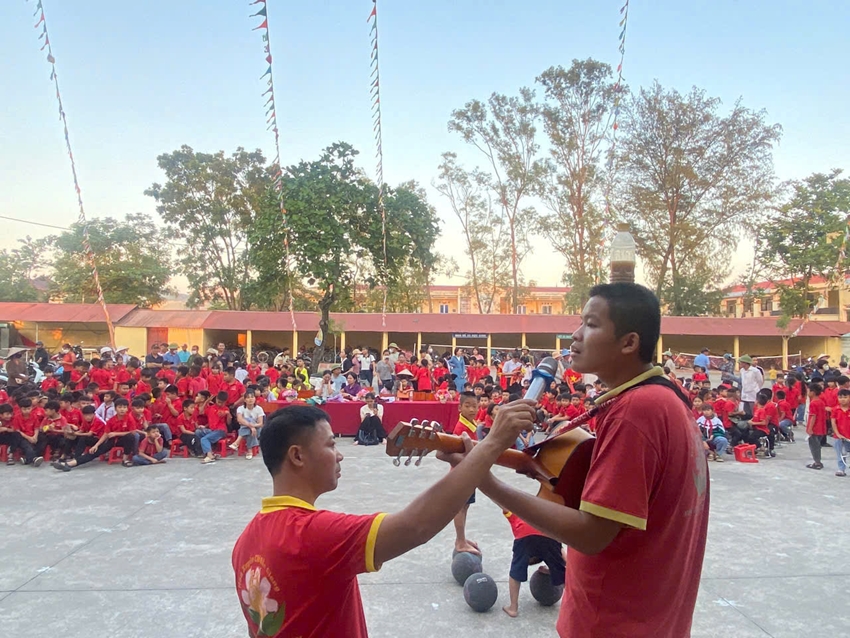Over the past 15 years, the number of children diagnosed with autism has significantly increased, becoming a pressing social issue that requires urgent attention.
Statistics also indicate that the challenges posed by autism spectrum disorder have lifelong effects on individuals' bodily functions, quality of life, and the labor force, which in turn leads to a long-term economic burden for their families and society as a whole. Many individuals with autism face an uncertain future as their loved ones grow older; the cost of care increases while their ability to work and support themselves diminishes. The question of what will happen to them once their guardians pass away is a distressing social security issue.
To help children integrate into society, live independently, and secure a better future, a collective effort from parents, society, and especially support from the government is required through effective and timely mechanisms and policies. This is the message that "Igniting the Future for Children with Autism" aims to convey, as highlighted in the September edition of Nhan Dan.
There is dim light at the end of the tunnel
Vietnam has over 1 million people with autism, many of whom are pessimistic about their future due to their inability to care for themselves. However, there are efforts and models in place to assist them in overcoming these challenges and moving toward a brighter future.
 |
| |
From the “Spark” of Hoa Xuyen Chi
Vu Van Chuc, born in 1987, graduated from Hanoi University of Science and Technology and previously worked for major corporations such as Coca-Cola, Big C Supermarket and Metro. However, he decided to change his career path to become a life coach, focusing on helping children with autism, particularly teenagers with severe cases.
This commitment led to the establishment of the Hoa Xuyen Chi Center in Bac Giang. Educating severely autistic children, especially teenagers, is a challenging mission that some would refer to as “divine punishment.” This line of work is not only technically demanding but also emotionally taxing. Mr. Chuc recalls a heartbreaking moment when a parent asked, “If I die, who will take care of my child?” This question highlights the deep fears of parents as they age and worry about their children’s futures, especially when social support systems are inaccessible for these individuals.
The situation is alarming, with autism affecting about 1% of all births. The number of diagnosed cases has skyrocketed, increasing fiftyfold from 2000 to 2007. Autism accounts for 30% of children with learning disabilities, impacting millions of families. As these children reach puberty, parents face even more challenges.
Mr. Chuc noted that the world struggles to address the needs of severely autistic teenagers, often resorting to sedatives that can lead to weight gain and other issues. Tragically, some families feel compelled to confine their children for safety.
At Hoa Xuyen Chi, many children arrive with severe behavioral issues, but after 2-3 months, they often show positive changes, such as improved sleep and reduced disruptive behaviors. For example, Duc Loc, who initially weighed 120 kg, lost 30 kg in two months through a structured diet and training, transforming into a helpful assistant at the center.
Phuc, who struggled academically and engaged in petty theft, has thrived under Mr. Chuc's guidance, demonstrating agility in physical activities and serving as a right-hand man at the center.
During a recent "Children's Day" celebration at Hoa Xuyen Chi, I was amazed to see the children perform impressive feats, including balancing on balls and juggling. Notably, Thanh Nam from Hai Phong showcased his skills by juggling six tennis balls and balancing a water bottle, even applying for six Guinness World Records—an extraordinary achievement for a child with severe autism.
Mr. Chuc's work combines caregiving, training, and scientific research, implementing a creative educational program. His project on training autistic children without medication won gold medals at international exhibitions in Romania and China.
Ultimately, working with these children requires immense love and patience. Mr. Chuc sees them not as patients but as unique individuals, like diamonds needing refinement. Hoa Xuyen Chi is always ready to accept more severely autistic cases that other centers may reject.
With the motto "Love is the track, discipline is the rails," Mr. Chuc creates a supportive environment at Hoa Xuyen Chi, which serves as a second family for autistic children. He believes that "the light at the end of the tunnel" is emerging, as he anticipates that 15 children will soon be able to care for themselves, with some even receiving salaries.
Nguyen Van Them, Deputy Director of the Bac Giang Department of Education and Training, remarked, "I have seen a bright path for the career development of autistic children while supporting the Hoa Xuyen Chi Center since its establishment. Here, children with autism receive care and education, showing significant positive changes."
 |
| |
The Challenging Path to Recognition as a Person with a Disability
When her daughter, born in 1996, turned five, Dr. Nguyen Thi Tuyet Hanh noticed unusual behaviors, such as a preference for solitary play, sudden outbursts of anger, and even self-harm. Despite her background in education, she struggled to understand her child's condition. Seeking help from the Special Education Department at Hanoi Pedagogical University and exploring foreign resources, she learned that her daughter had autism. This revelation left her shocked and desperate, as autism was poorly understood and difficult to treat in Vietnam at the time, even among doctors at the Central Pediatric Hospital.
While her daughter was in third grade at a private school, the institution refused to allow her and two other autistic children to continue due to their disruptive behaviors. When her daughter asked, "Why are we going home? I like this school," Hanh's pent-up emotions overwhelmed her, and she broke down in tears.
Refusing to accept this situation, Hanh and other parents in similar circumstances founded the "Hanoi Autism Family Club" (now renamed "Hanoi Autism Family Association" as the children have grown). In 2007, the United Nations designated April 2 as World Autism Awareness Day to encourage greater understanding of the condition. From a place of ignorance regarding autism, the Vietnam Autism Network was established in 2013, supported by the Vietnam Federation of Persons with Disabilities. Although the Hanoi Autism Family Association is now part of the Hanoi Disabled People's Association, the journey to recognize autistic individuals as people with disabilities remains fraught with challenges.
Previously, Hanh and many other parents were unable to obtain disability certificates for their children because existing policies did not address autism. As a result, they received no financial support or benefits from the government.
The majority of older autistic individuals do not complete middle school, as public schools often refuse to enroll them, leaving them with only elementary school diplomas. Autistic children frequently lack access to educational methods suited to their cognitive needs, and there is virtually no state-sponsored vocational training for them.
Dr. Tuyet Hanh noted, "Most autistic children are not diagnosed or given early intervention (except for those in major cities). Inclusive education lacks special support from schools. Trained professionals in healthcare, education and therapy are scarce, often having received their training abroad. The shortage of qualified teachers and therapists further worsens the situation. As the number of autistic children rises, relevant authorities have not provided adequate attention, leading to a proliferation of unregulated centers for autistic education. Most autistic adults remain unemployed and lack support services in old age, placing a heavy burden on their families."
The Disability Law and its detailed regulations do not mention "autism." In practice, autism is often grouped with other disabilities without specific classification.
A positive development occurred with Circular 01/2019 from the Ministry of Labor, Invalids and Social Affairs, which for the first time included the term "autism." Specifically, in Appendices 01, 02 and 03 of this circular, autism is classified as a distinct disability, requiring a medical assessment from a provincial-level facility.
Though late, this marks a hopeful beginning in the innovation of social policies that over one million autistic individuals in Vietnam are eagerly awaiting./.